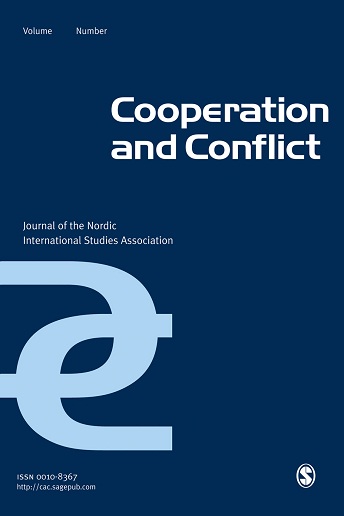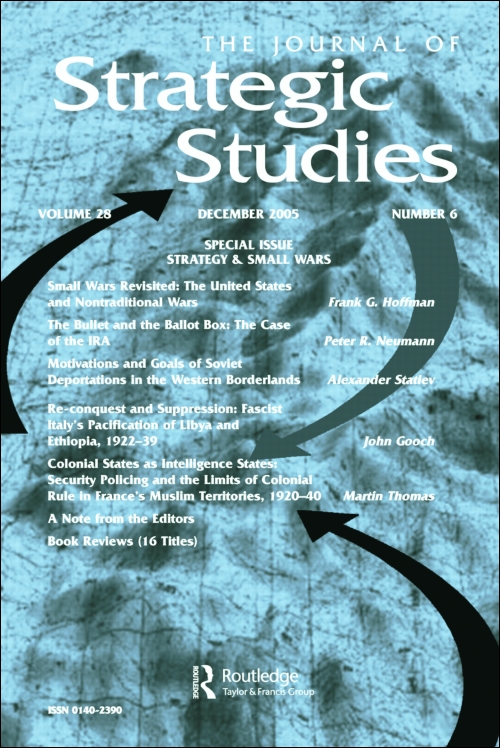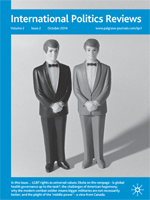My latest article on Russian diplomatic practices in multilateral security organisations has been published by the European Journal of International Relations. It is available online and in pdf.

I just published an article on NATO in Afghanistan in the journal Cooperation and Conflict. The article is available online and in PDF. I reproduce the abstract below:
This article investigates the NATO campaign in Afghanistan through a practice-based approach. The structural distribution of power within NATO, which is obviously in favor of the US, does not automatically lead to Washington’s desired outcomes, and US delegates must competently perform a certain number of practices for their power advantage to take its full effect. The article also illustrates how looking at practices helps to explain policy decisions, such as NATO’s decision to engage in Afghanistan, the establishment of an International Security and Assistance Force (ISAF) strategy and the wording of policy papers. By studying a case of military diplomacy, the article contributes to the emerging scholarship aimed at bridging the gap between diplomatic studies and practice-based approaches to International Relations.

I published two articles in the Journal of Strategic Studies on France’s defence policy. They are part of a special issue on France in the transatlantic security order I guest-edited, and which includes articles from Alice Pannier (US-UK-France relations), Stephanie Hofmann (French party politics and policies towards NATO), Olivier Chopin (intelligence reform), and Élie Tenenbaum (irregular warfare).
Below are the abstracts and the links to the two articles, available in open access thanks to the SDU library.
“The Reluctant Atlanticist: France’s Security and Defence Policy in a Transatlantic Context” (link) (pdf)
This article introduces the key tenets of French foreign and security policy during the Cold War, and illustrates the deep challenges to the French consensus raised by the emergence of a unipolar system. There is a growing gap between the rhetoric of French security policy, emphasizing ‘autonomy’ and ‘sovereignty’ out of habit from the Cold War, and the actual security practices showing a gradual embedding within the transatlantic security structures. In the absence of a new transpartisan grand narrative relevant for the contemporary international system, such embedding is easily portrayed in France as a ‘treason’ from a romanticized Gaullist foreign policy.
“French Military Adaptation in the Afghan War: Looking Inward or Outward?” (link) (pdf)
For some, a specific feature of the French armed forces’ adaptation process would be the capacity to look inward instead of outward in order to identify relevant solutions to tactical/doctrinal problems. This article questions such a narrative, and argues that the French armed forces are as quick as any to borrow from other countries’ experiences. In order to do so, this article introduces the concept of ‘selective emulation’, and compares the French and German military adaptation processes in Afghanistan. The article argues that there is indeed something distinctive about French military adaptation, but it is not what the fiercest defenders of the French ‘exceptionalism’ usually account for.

I published a review essay article in International Politics Reviews entitled “A War Worth Fighting? The Libyan Intervention in Retrospect”. You can access the article here or download the pdf, and I reproduce the abstract below.
 “The Libyan intervention, originally considered a success for NATO in the context of the ‘Arab spring’, is now criticized for creating the political turmoil Libya is currently going through. The three books under review offer different perspectives on the intervention itself, raising important questions about its conduct and its consequences. They also indirectly raise the issue of the difficulty to write about contemporary warfare”.
“The Libyan intervention, originally considered a success for NATO in the context of the ‘Arab spring’, is now criticized for creating the political turmoil Libya is currently going through. The three books under review offer different perspectives on the intervention itself, raising important questions about its conduct and its consequences. They also indirectly raise the issue of the difficulty to write about contemporary warfare”.
I just published an article in the collection “Focus Stratégique” edited by the French think-tank IFRI, focusing on the challenges of coalition warfare. I reproduce the abstract below.
“Contemporary multinational military operations occur in a strategic context characterized by the domination of limited conflicts for Western states. As such, those interventions are marked by a tension between the military logic of integration as a condition of effectiveness and the political logic of state autonomy. This situation leads to a number of specific dynamics, such as the imposition of restrictions on the use of force (“caveats”), the difficulty to achieve the unity of purpose and the unity of command, and the search for an increase of international legitimacy through the number of participants to the intervention. This article analyses the dynamics of contemporary multinational interventions, and explores potential ways to manage the difficulties related to the dialectic between integration and autonomy.
I published an article (in French) in the prestigious Revue Défense Nationale on “Nato and the End of the Expeditionary Model”. It is available online and in PDF.
Here is the abstract: After twenty years of expeditionary activities, we can see the emergence of a less interventionist posture within the Atlantic alliance. A less interventionist NATO would nevertheless keep its utility as: a communication channel between the Europeans, the Russians and the Americans; a socializing institution for newcomers; a deterrent capability in new areas of collective vulnerability.
The paper is published in a special issue on NATO, which deals with many aspects of the alliance in a fresh and multinational perspective. You can access the TOC here.